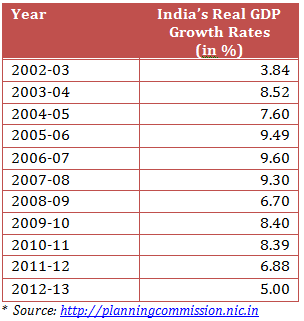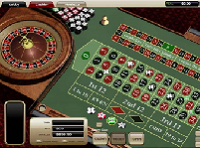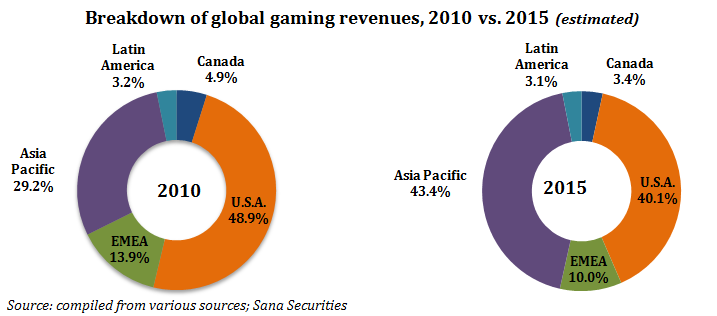The factors considered below present an overview of the gaming industry in India. The analyses below are based on the circumstances of Delta Corp Limited which runs the largest casino operations in India.
WHAT’S DRIVING THE STOCK
Rising internal consumption and favorable demography

The Indian growth story is a very favourable one with more than 50 % of its population below the age of 25 and more than 65 % below the age of 35. It is expected that, in 2020, the average age of an Indian will be 29 years. Such a ‘young’ economy with growing disposable incomes and greater exposure to western lifestyles is encouraging for the growth of entertainment and casino industry.
Further, Asia is the fastest growing market for casinos. Gaming in the Asia-Pacific region has grown phenomenally over the last few years. Until recently, Indians have been forced to travel to destinations like Macau, Singapore and Kathmandu to experience the thrill of betting. However, with casinos now opening in Goa, Sikkim, and Daman which are at par with the best in the world, the gaming industry in India is set for exponential growth.
Even though the Indian gaming industry was recently legalized, revenue generated from casinos in Goa is growing at an annual rate of over 50 %. In comparison, Macau, Philippines, and Singapore have witnessed a revenue growth of approximately 30 to 40 %. We believe that over the next few years, India will become a popular destination for casino goers; not just in Asia, but the whole world.
First mover advantage in the lucrative gaming industry in India

Gaming industry in India bears high entry barriers due to a strict cap on the number of licenses issued. Delta Corp has the first mover advantage in this space and holds 3 of the 6 casino licenses issued in Goa, and both the licenses issued in Daman. With the casino industry in Goa growing at an annual rate of 50 %, we believe that regulations for existing and new players in this space will be relaxed further. A relatively lengthy process for obtaining licenses for casino business in India; and the considerable time and costs involved in setting up the requisite infrastructure, which Delta already has in place, puts it at a strong competitive advantage.
Expansion plans
Currently, Delta Corp has 700 live gaming positions (660 table positions and 40 machines).
It is expected to expand its positions in Goa through the launch of another casino vessel M.V. Horseshoe, which is expected to be operational shortly. This new casino is expected to have 1,500 positions (155 tables and 250 slot machines). During the financial year 2013-14, the Company is also expected to launch a land-based casino in Daman through its hospitality project named ‘The Deltin’, adding approximately 1,000 additional positions. Further, the total gaming positions of the Company is set to grow five-fold with the commencement of a new casino vessel in Goa and a 5-star hotel-casino resort in Daman.
Deltin is the largest integrated resort in Daman; spread over 10 acres with approximately 300,000 sq. ft. of developed area. This hotel will offer the largest banquet facility in the area with 3 bars, 4 speciality restaurants, 29,000 sq. ft. of indoor event (MICE space) and 8,000 sq. ft. high-end retail space. The Deltin, Daman is only a 2.5 hour drive from Mumbai, and a similar driving distance from major cities of Gujarat.
Delta Corp has recently acquired an all-suite hotel namely “Deltin Suites” located at Nerul in North Goa. Deltin Suites is well equipped with all amenities and recreational facilities. The property is a 5 to 10 minute drive from the beaches of Candolim and Calangute, and is in close proximity to the embarkation points of Company’s respective casinos.
In a move to boost its tourism industry, the government of Sri Lanka legalised casino gambling in November of 2010. Sri Lanka is well positioned to become one of the major gaming hubs of South Asia due to its potential to attract additional visitors from nearby countries such as China, Australia and Malaysia. The Company is exploring the possibility of starting casino operations in Sri Lanka and has taken initial steps in acquiring an 11 acre land parcel near the Bandaranaike international airport at Ketunayke to develop a high-end hotel.
WHAT’S DRAGGING THE STOCK
Strict government regulations
For the most part, Indian legislatures and courts have considered gambling to be an immoral act which is detrimental to the interest of the common man as the thrill of the sport continues until a player experiences heavy losses. For this reason, gaming industry in India is subject to several rules and regulations. It is largely dependent on licensing which is purely subject to Government approvals.
In Goa and Daman, where most gaming countries have their operations, the laws (i.e. The Goa, Daman and Diu Public Gambling Act 1976), allow casinos to be set up only at five star hotels or offshore vessels with the prior permission of the government. In general, casino licenses are awarded for a term of 5 years from their respective date of issuance, at the expiry of which period they have to be renewed at the payment of a prescribed fee. Moreover, there is always a possibility of stringent or adverse changes in government policies in the gaming industry in a conservative country like India.
Economic Slowdown
Due to a slowdown in economy, both internationally and at the domestic front, there has been substantial reduction in spending on entertainment and leisure. High inflation and fuel prices have resulted in air travel getting more expensive due to which domestic travelers in particular have cut back on their travel plans. Gaming operation in India are located in tourist hubs like Goa and Daman and relay on out of state tourists for their revenues. A further slowdown in the Indian economy could adversely affect the gaming industry in India.
_____________________________



Create Wealth to Create Jobs
Our current Personal Income Tax slabs are :
> Up to Rs 2.0 Lakhs………………….. NIL
> 2.1 Lakh – 5.0 Lakh……………….. 10 %
> 5.1 Lakh – 10.0 Lakh………………. 20 %
> More than Rs 10 lakh……………….. 30 %
That means , the more you earn , the more tax you pay !
How does this wrong tax regime hurt our economy ?
This regime ,
> Punishes honest people
> Penalizes wealth creation
> Encourages creation of ” Black Money ”
> Provides incentive for tax evasion
> Diverts resources into unproductive assts such as cash/gold/land etc
> Stops people from working harder / smarter
With this regime , people tend to ask :
> Why should I work hard and earn more , if the more I earn the more I
pay ?
> Why not evade paying taxes by hiding real income ?
> How will I ever be able to buy that 1 room flat costing Rs 50 lakhs ? I
need Rs 20 lakhs by way of black money to buy it ! Where do I get that ?
> For every rupee that the government collects from me as tax , only 15
paise come back to me in the form of civic amenities .
A few years back , the tax regime was worse !
One ended up paying , by way of tax , Rs 0.93 from every rupee earned !
And after heaping on the honest tax-payers , all such disincentives , how much does our government collect by way of taxes ?
> Total Tax Receipts ……………………………….. Rs 12.4 Lakh Crores
> Personal Income Tax contributes………………..Rs 2.47 Lakh Crores
Is there a way to raise that Rs 2.47 lakh Crores to Rs 247 Lakh Crores ?
Can we raise it by 100 FOLD ?
I am not an Economist ( my advantage ! )
So , here is my crazy suggestion
” Inverse ” the tax slabs as follows :
> Up to Rs 2 lakhs………………… NIL
> 2.1 – 5.0 lakhs…………………. 10 %
> 5.1 – 10 lakhs………………….. 8 %
> 10.1 – 20 lakhs…………………. 6 %
> 20.1 – 50 lakhs………………… 5 %
> 50.1 – 100 lakhs………………… 3 %
> Above 100 lakhs…………………. 1 %
What is likely to happen with such ” INVERSE TAXATION ” regime ?
Following few things :
> Total personal tax payer base will go up dramatically from current 4
crores tax-payers
> Total personal tax collection too , will rise dramatically
> Today , only 1 % of 4 crores tax payers ( approx 4 lakhs ) , contribute
nearly 63 % of personal tax revenue ( of Rs 2.47 lakh crores )
This ratio will change to , may be , 20 % of tax payers !
> with this ” INVERSE TAX REGIME ” , there will be no incentive to evade
taxes and to generate ” BLACK MONEY ”
The more you disclose as your income , the less you pay by way of taxes
> For a change , we will learn to reward honesty / efficiency / productivity !
No need to bribe those Income Tax officers !
> Suddenly , lakhs of crores of BLACK MONEY , stashed away in bank
lockers / gold / land – and , of course those Swiss bank accounts – will ,
suddenly become ” WHITE MONEY ” !
> There will be a huge surge in bank deposits ( – even with , the inevitable
lower interest rates )
> Banks will be awash with funds to finance businesses / infrastructure
projects etc , encouraging entrepreneurs / self-employed to set up new
businesses ( at 2 % interest rates of loans ) and generate millions of jobs
> There will be a phenomenal rise in Capital Markets
Now couple this ” INVERSE TAX REGIME ” , with the following ” TAX FREE ” investment schemes , by creating Special Purpose Vehicles ( SPV ) :
> NaMo MEGA-CITY SPV
To implement Narendra Modi’s ambitious project to build 100 smart cities,
at an investment of Rs 70 lakh crores , in next 5 years
This project alone will create 5 million new jobs , every year
> RaGa MEGA – JOBS SPV
To implement Rahul Gandhi’s equally ambitious project to provide jobs to
50 million youth over the next 5 years , at an investment of Rs 50 lakh
crores
In my opinion , such ” INVERSE TAX REGIME ” , coupled with the above mentioned SPVs , will herald an ” ECONOMIC ECO – SYSTEM “, which,
> will create jobs
> shun tax evasion
> reduce corruption
> convert all BLACK MONEY into WHITE MONEY
> channelize these WHITE MONEY into nation-building projects
To complete this ECO SYSTEM , we need to think ” Out of the Box ” in the matter of Corporate Tax Regime , as well
Current trend in industry , all over the world , is to
> Add highly productive , very expensive machinery to ” Automate ” all
manufacturing processes
> Reduce manpower by increasing ” Capital / IT Intensity ”
> Hire low skilled workers by transferring higher ” Skills ” to machinery
> Outsource manufacturing to countries where manpower is cheap
> Move out of ” Manufacturing ” and shift to ” Services ”
India cannot swim against this World-wide Trend
We must innovate, to not only survive but to grow in this scenario
Here is my suggestion :
Set in motion , ” INVERSION of JOB REDUCTION ” regime , under which ,
” The more jobs a company creates , the less Corporate Tax it pays ”
Example :
> Up to employment of 100 persons …………………………. 30 % tax
> 101 – 500 persons……………………………………………. 25 %
> 501 – 1000 persons …………………………………………… 20 %
> 1001 – 5000 persons ………………………………………….. 15 %
> 5001 – 10,000 persons …………………………………………. 10 %
> Above 10,000 persons …………………………………………. 5 %
Let us celebrate those who provide employment to large number of persons
Let us celebrate BIGNESS
Let us create hundreds of WORLD SIZE corporations and take on the World
On top of this , provide additional tax – breaks ( discounts ? ) to corporate as follows :
> Average Age of Employees at 30 years………………….. 1 %
> Ave age at 25 years…………………………………………. 2 %
> Ave age at 20 years …………………………………………. 3 %
Of course , very strict and transparent rules will need to be framed to
compute,
> Number of Employees ( Permanent – not probationers / trainees )
> Average Age ( as on 31 March of Tax year )……etc
But , here is an important aspect of this ,
” Incentivize Job Creation ” Scheme
Today’s labour laws make it extremely difficulty – if not impossible – for employers to layoff / retrench workmen , if demand shrinks
Hence , to take advantage of this Scheme , employers are unlikely to hire thousands of youth , if they cannot easily trim the workforce , to match the shrinking demand
So , an important corollary of this Scheme is to modify our existing Labour Laws to facilitate layoff / retrenchment , when situation so demands , while protecting the interests of the workmen concerned
And , last but not the least , permit each and every candidate – and the political parties as well – to spend ANY AMOUNT on election campaigns ,
without any restrictions as also accept any amount of Corporate Donations
by cheque
I rest my case !
* hemen parekh ( 27 Feb 2014 / Mumbai )